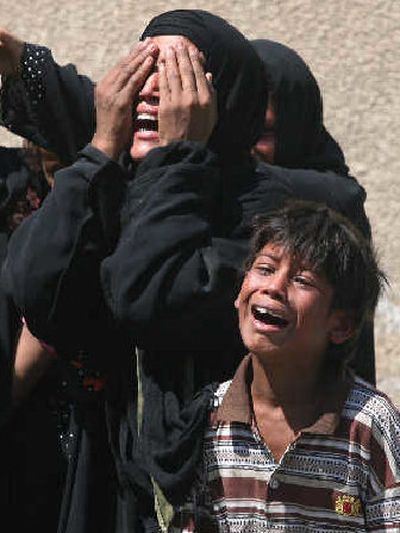Iraq violence soars as criticism grows

BAGHDAD, Iraq – On a day in which nearly 100 dead bodies testified to Iraq’s unbridled violence, Democrats stepped up their response to President Bush’s policies, with former national security adviser Zbigniew Brzezinski calling the war “unwinnable.”
Iraqi officials announced they had discovered the bodies of 60 people who apparently had been executed, many after torture, over the previous 24 hours. They said there was no single massacre or mass execution that had led to the toll. Rather, the slaughter in two Baghdad neighborhoods was likely the result of multiple, roving assassination teams, they said.
In addition to the apparent executions, a pair of car bombs and other violence took at least 35 more lives and left scores injured Wednesday, officials said. And U.S. authorities reported the deaths of two more American soldiers – one killed by a roadside bomb south of Baghdad, and another killed in action in Anbar province, the hotbed of the Sunni Arab insurgency in western Iraq.
In his televised speech Monday, Bush said that U.S. security “depends on the outcome of the battle in the streets of Baghdad” – setting a theme that Republicans hope will sustain political support for the war and their candidates between now and November’s elections.
Democrats, who have been divided in their own policy toward the war, offered a two-pronged response Wednesday. Brzezinski, the national security adviser under Jimmy Carter, accused the administration of committing the U.S. to an unachievable goal. The Bush administration’s aim of creating “a secular, stable, democratic Iraq” is “simply unreal,” Brzezinski said during an appearance on Capitol Hill with retired Gen. Wesley Clark, the NATO commander under Bill Clinton.
Meanwhile, Rep. John Murtha, D.-Pa., a conservative Democrat and former Marine who has become an outspoken critic of the war, said that Iraq has become a crushing burden on the U.S. Army. The war has created equipment shortages and badly strained soldiers as well as Marines, Murtha said.
Army officials responded in a statement that “we are an Army at war and there is a cost to war.”
U.N. Secretary-General Kofi Annan also weighed in on the debate, saying at a news conference in New York that many leaders he had met with on a recent trip to the Middle East felt that the invasion of Iraq “has been a real disaster” that has destabilized the region. But they were divided on whether a departure of U.S. forces would make matters better or worse, he said.
“In a way, the U.S. has found itself in the position where it cannot stay, and it cannot leave,” Annan said.
With the war shaping up as the dominant issue in the fall election, the administration and its critics have sought to shape public perception of what the U.S. ambassador here, Zalmay Khalilzad, has labeled the Battle of Baghdad.
The administration’s efforts were notable on Wednesday, as U.S. and Iraqi authorities disputed each other’s accounts of the day’s high death toll.
A U.S. military spokesman said the body count for the 24-hour period in question was actually about half of that reported by Iraqi officials. The dispute underscored how statistics on killings here have become hotly contested, particularly since the U.S. military launched a highly publicized security effort during the summer. The security plan included the deployment of 8,000 additional U.S. troops to patrol with Iraqi forces in an effort to bring order to the capital.
“We remain confident that these joint operations continue to be effective in reducing the violence in Baghdad,” said Lt. Col. Barry Johnson, a military spokesman here.
On the Iraqi side, Muayed Matrood, an official at the besieged Baghdad morgue, said Wednesday’s body count showed that “the phenomenon of a large number of unidentified and tortured corpses has returned back to Baghdad.”
The morgue is due to receive two new refrigeration facilities to help handle the onslaught of corpses. “This is the first time in weeks that a number as large as this has been found within a day,” Matrood said.
The Baghdad morgue had reported receiving about 17 percent fewer bodies in August than in July. That figure had created expectations that a downward trend could continue into this month. But violence increased markedly in the last few days of August and has continued unabated since then, sapping hope that the wanton killings would abate.
Indeed, the large toll of bodies caused hardly a ripple in a capital that seems increasingly anesthetized to grim tidings. People went about their business, the government convened meetings, and the discovery didn’t make major news.
The 60 bodies, all men, were found scattered in two separate city neighborhoods, Karkh, a mostly Sunni area in western Baghdad, where 43 were discovered, and Rusafa, a mostly Shiite area in eastern Baghdad where 17 were found.
Most of the victims had gunshot wounds to the head, which has become the signature of death squads here. Some of the bodies were handcuffed and blindfolded and showed signs of torture.
Among those killed here on Wednesday was a journalist, Safaa Ismael Enad, 31, a freelance photographer who was accosted by two gunmen in a photo studio where he was working. The gunmen asked for him by name, a colleague said, before opening fire.